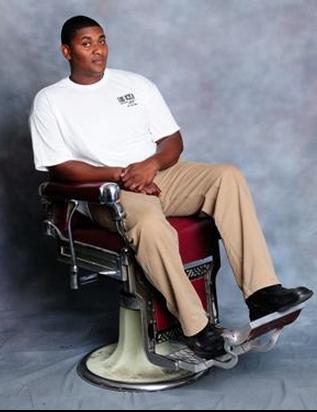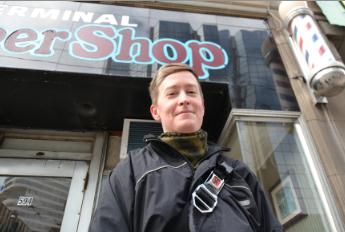
Sean Gibson, of the Ontario Barber Association, wrote a letter in defence of the barber. Credit: livingrock.ca
All she wanted was a haircut.
But when Faith McGregor walked into the Terminal Barber Shop at Bay and Dundas streets, she was shocked to hear from the owner that no barber at the shop would cut a woman’s hair because it goes against their religious beliefs.
McGregor has since filed a complaint about the June incident with the Ontario Human Rights Commission (OHRC).
The shop wasn’t busy that day, she says, and two barbers were standing at the back of the store. “I asked, ‘Do you do a businessman’s cut?’ It’s a basic haircut. They said they do.”
After describing the cut, owner Omar Mahrouk stopped her. “He just looked at me and said, ‘I can’t do that. We don’t cut women’s hair here.’”
McGregor says she was shocked. “I just wanted the exact same cut as they would give a man. Nothing different.” The 34-year-old dyke says she always gets her hair cut at a barber shop, not a salon.
Mahrouk told her “it’s against his religion” to cut a woman’s hair, she says. Mahrouk and two other barbers refused, all saying they practise Islam, which forbids them to touch strange women, she says.
For his part, Mahrouk admits that he denied McGregor service. “I can cut my wife’s hair, but not a strange lady. For me this is not discrimination. I explained that I have nothing against woman. This is my religion. She did not accept it.”
The Ontario Human Rights Code states that business owners can’t deny service based on sex.
“The law is the law, but this is my religion. But I am not discriminating against anyone,” Mahrouk insists. “It is against my religion.”
On the surface, the Human Rights Code says Terminal Barber Shop appears to have discriminated against McGregor based on her sex.
But it’s not that simple, says Pascale Demers, communications officer for the OHRC. This is a case of competing rights: the individual right of a person not to be discriminated against based on their sex or gender and the right of a person to hold religious beliefs.
“Generally speaking, services that are offered to the public should be made available to everyone without discrimination, based on sex, sexual orientation, race, religion, disability,” Demers says. “Each side will bring forward a defence that their rights trump the other.”
She says it’s a case that presents new terrain for the Tribunal. “We have been unable to find any cases like this. It’s unique. It will be looked at in an individual context, each with its own unique set of evidence. The tribunal will make a decision based on its set of facts presented to them.”
No rights are absolute, Demers says, and there is no hierarchy of rights.
“We look at cases individually,” she says. “We have to look at ways both sides can be accommodated. But, absolutely, there will be instances where one side will be dissatisfied, though they are claiming a right.”
If the Tribunal finds that the barber shop violated McGregor’s rights, it could order a monetary settlement or order the shop to implement a set of “public remedies,” such as ordering the shop to offer services “in a way that is considered non-discriminatory.” That may involve hiring additional staff, for example, she says.
“It’s not a punitive process per se; it’s about bringing the person back to a place that is not discriminatory.”
If Mahrouk fails to comply, she says, the shop “could keep facing complaint after complaint, and it could eventually get costly.”
Mahrouk says that if he is forced to serve women he will have to change his occupation.
His lawyer, David Kolinsky, says denying service on religious grounds is valid. Still, even without the religion factor, barber shops have traditionally been men only.
“I understand she wants the same type of haircut that would be provided to the male patrons, but it’s more complicated than that,” he says. “She wants the barber shop to be compelled to provide service to all women. That goes well above the skill set and training of these barbers.”
But McGregor says that’s not true. “I am not asking that the shop start servicing all women, regardless of the type of cut requested.”
If a woman asks for a service they already provide, they should not be turned away, she says.
“It seems they are extending the scope of my complaint,” she says. “My specific request was for only the exact same cut they would provide to a man . . . We are no different from the neck up.”
“I would not expect the shop to start cutting the hair of my female friends with long hair, colours or perms.”
Sean Gibson, of the Ontario Barber Association (OBA), wrote a letter in defence of Mahrouk explaining why the distinction between “barber” and “hairstylist” justifies Mahrouk’s discrimination against women.
Gibson says barbers should have the autonomy to decide because barber shops have traditionally been male-only spaces.
“In certain countries, men just service other men for religious reasons. It’s not that they don’t want to service women, but because of their religious beliefs they can only cut the hair of other men,” he explains. “While that may seem archaic, it’s understood. The history goes back to men-only bathhouses in ancient Greece. That’s where barber shops started. They were only places for men.”
Still, Gibson says Mahrouk did not intend to discriminate in a malicious or disrespectful way, but “perception is everything.”
“He was unable to service her because of his religious beliefs. So it’s a discussion of what’s more important: obliterating his religious beliefs or serving this young lady? Denying his rights or denying her rights.”
“She can still get service, maybe not from this specific place, but I’m sure one of our [OBA] members would be glad to cut her hair,” he adds.

 Why you can trust Xtra
Why you can trust Xtra


